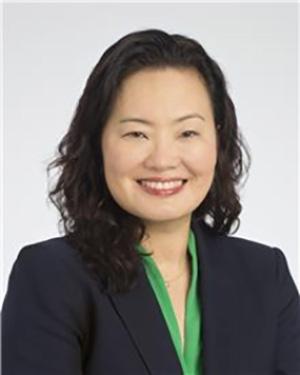Research News
04/28/2025
$2.6M grant to refine gastric cancer screening AI with federated learning
Cleveland Clinic researchers received an NIH MERIT award to use federated learning techniques to test a predictive model for gastric cancer screening on a national scale.

The National Institutes of Health (NIH) has granted Cleveland Clinic’s Michelle Kang Kim, MD, PhD, a 5-year, $2.6 million award to lead a nationwide team of researchers, clinicians and computer scientists in assessing the feasibility of stomach (gastric) cancer screening in the U.S. She and her team will use federated learning techniques to refine and validate a machine learning algorithm which uses patient records to identify at-risk individuals who could benefit from regular screening.
The NIH independently elevated Dr. Kim’s award from a standard research project grant to R37 MERIT award, which identifies her and her research program as “exceptional, distinctly superior, and likely to ... perform in an outstanding manner."
What is federated learning and how can it help with gastric cancer screening?
Gastric cancer is easy to treat when caught early, which can be done with an upper endoscopy. However, because endoscopies are time, labor and cost intensive, it is not feasible to test everyone.
The machine learning model that Dr. Kim’s team previously developed analyzes risk factors to identify patients at high risk. Along with refining the model using 15 years of patient chart data, Dr. Kim’s team aims to use federated learning to collaborate with institutions across the country to test the model’s accuracy in a more heterogeneous, generalizable cohort. Federated learning is a method that lets independent locations work together to train machine learning models without sharing raw data with each other, which is crucial for healthcare institutes aiming to collectively analyze patient records while maintaining confidentiality.
Using data from Cleveland Clinic and Columbia University, Dr. Kim’s team will develop and internally validate the risk prediction model. Dr. Kim and her Columbia University collaborator Chin Hur, MD, will then share the prediction model with a team of investigators at University of California San Diego (UCSD).
“The patient population in San Diego is pretty different from the populations seen in Cleveland, Florida and New York,” says Dr. Kim, who is the department chair of Gastroenterology, Hepatology & Nutrition. “External validation with UCSD patients will show that our risk prediction model can be broadly applied across the country, not just in Cleveland Clinic and Columbia University.”
How will the team simulate AI-guided gastric cancer screening on a national scale?
After the model is validated, it needs to be tested on a national scale to see if it can predict when new patients should receive endoscopies.
“This will be a cost-effective intermediary step we can take before we actually do a trial,” Dr. Kim says. “Rather than actually doing a very expensive study, we do a simulation of it to see mathematically if this is going to work.”
The NIH granted Dr. Kim and her team additional funds to use computer simulation to demonstrate that their model will be feasible and cost effective. The team will use mathematical modeling and computer science to generate large numbers of hypothetical patients who have their own unique disease trajectory to determine if their prediction model can detect at-risk “patients” in “real time.”
The team’s goal is to produce a comprehensive risk prediction model that allows physicians to institute gastric cancer screening in the US and improve prognoses for patients diagnosed with the disease. The NIH award will support them in this goal for five years, with the option for an additional two years of funding depending on the study’s results.
Featured Experts
News Category
Related News
Want To Support Ground-Breaking Research at Cleveland Clinic?
Discover how you can help Cleveland Clinic save lives and continue to lead the transformation of healthcare.
Give to Cleveland Clinic